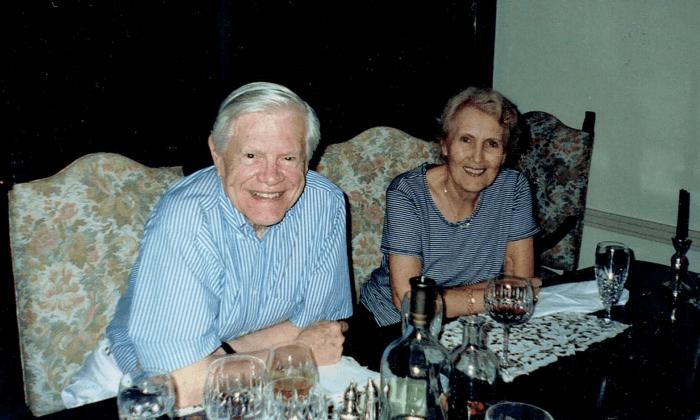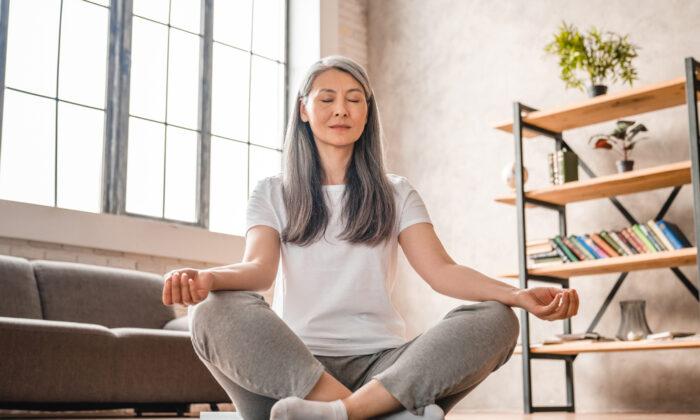As a family physician, I’ve often been inspired by those in their 80s and 90s who are aging well, and wondered what they were doing differently. Upon looking deeper, I found certain commonalities, yet each person’s path was uniquely their own.
This older generation is different from today’s. It’s steeped in traditions and values; they knew their neighbors and thought of others first. They grew up in a kinder, gentler time, and have great insight, if only we take the time to listen.
At 87 years old, Monique Reeves belies her age. She needs no cane. That would interfere with playing tennis. She takes no medication, except the occasional Tylenol for an ache after a match.
Her Story
She was born in 1933 in the port city of La Rochelle, France, to parents who always had a positive outlook and loved each other.“They never fought or yelled at each other. I was very lucky. I had a wonderful family,” she told me one afternoon.
Life was not always easy, she said. Monique was a child during the Nazi occupation of France, and lived through times most of us couldn’t imagine.
Relationships
Despite the hardships, Monique stayed positive and has had a great life. As a young woman, she enjoyed her work in the travel industry, eventually settling in Pittsburgh. It was there that she met and married Jack Reeves, her husband of 55 years.
“Jack was so nice and we got along so well. We never screamed at each other. If there was something we didn’t like, we’d say it in a civilized manner. We respected each other. I think that is key in a marriage. We never said ugly things to each other—never swore.”
Socializing Promotes Good Health
Monique says she and Jack loved to travel and spend time with friends and family. Social connections were a vital part of their lives.“Jack was very social and he loved people, and I do, too,” she says.
They entertained often and were either invited out or hosted friends every Saturday.
“Socializing is important for health, because you can talk to your friends and forget about your problems.”
“People who were disconnected from others were roughly three times more likely to die during the nine-year study than people with strong social ties,” Robbins wrote.
Mind-Body Connection
A person’s mental state has also been shown to play a critical role in their health.Monique remembers a difficult time when her children were young.
“I got nervous and my doctor gave me some medicine. I only took it for about a month. I thought, I need to take care of myself and take a walk every day, so I did. And I got myself better without medication.”
Monique walked daily and played tennis. She told herself that she had made herself sick and then she quickly healed herself.
Had Monique not changed her mental state, she may have suffered worse, according to several studies. The authors of a study published in Social Cognitive and Affective Neuroscience in 2015 concluded that “by simply learning skills of emotion regulation, one can improve physical health.”
Monique says mindset has played an important role in her health and she hasn’t been one to rush to a doctor for a prescription.
“I think it’s a bit true that disease is partly created in your mind. I think it’s important to be happy. My dad didn’t take a lot of medicine and I don’t either.”
Community Influence
Growing up, Monique had great examples of healthy living to draw from and apply to her own life. Her father is from Corsica, which is sometimes called “the Island of Beauty,” she said.Her uncle there lived to age 102, and died in his sleep. “He was very healthy. On his 100th birthday, he was walking around, and I don’t even remember him having a cane.”
Monique believes the longevity of people from Corsica comes from a combination of diet, exercise, and socializing.
“They’re very active, and the neighbors come and visit, and they make their own social life. That’s how they age well there ... They receive you with open arms.”
The people there eat a good variety of fruits and vegetables, and eat small portions. The Mediterranean diet has long been known by researchers as one of the healthiest in the world.
Monique grew up eating a Mediterranean diet in France, and took her eating habits from her mother.
“I never went on a crazy diet. When I wanted to lose a little weight, I would cut down, and use common sense; you benefit from it so much.”
Monique was never really sick and rarely goes to a doctor. She sees little need for complicated diets.
“Eat what you like, not what you don’t like, but don’t eat too much of it, keep it in balance.”
And so, Monique focuses on eating real foods while paying attention to portion sizes. She eats a modest breakfast of a small glass of orange juice and whole wheat or sourdough toast with real butter.
“I only eat things real. I’ve seen how my friends in France and relatives eat. They eat healthy and eat in moderation.”
“I get organic spinach or strawberries and other things when I can, but I don’t eat all organic food. I know I grew up on organic stuff. The farmers didn’t use a lot of those chemical things then.”
Lunch is Monique’s biggest meal of the day, while dinner is small and simple, such as goat cheese on a baguette or avocado toast and some fruit.
“It’s enough and I’m not that hungry at night.”
Studies have shown that Monique’s habit of having her biggest meal at lunch, rather than dinner, as most Americans do, goes a long way in maintaining a healthy weight.
Her advice to others is to avoid large portion sizes.
“I’d tell the restaurants to cut down on portions. The more you have in front of you, the more you eat.”
Although she eats out occasionally, Monique believes it’s important to cook at home.
Exercise for Mind and Body
Physical activity is a regular part of Monique’s life. She plays tennis three days a week and walks daily, but realizes these activities may not be for everyone.“With exercise, find something that you like. Some people say walking is boring but I like it, and I do about a half-hour a day. I just look around, and I enjoy hearing the birds. When I see my neighbors, I stop and say something, you know, try to socialize a little. That’s important.”
“I love good writing, and keeping abreast of everything going on, internationally too. I like to read novels a lot, too. I don’t watch too much TV. I think it’s important for the brain to stay active.”
Monique also is mindful about what she reads, and prefers novels that are relaxing and about good relationships and happy things.
Be Proactive About Your Health
Taking control of her health has always been important to Monique. It’s an idea that would benefit many, as lifestyle diseases such as diabetes and heart disease have become the nation’s top killers.“You should do what you can to have a good and healthy life. If you’re healthy, then you’re happy. I think people have to take responsibility for their health,” she advises.

Kindness Matters
Monique also believes we shouldn’t underestimate the effect that kindness has on our health.“Always be kind. I think being unkind is too prevalent today. I said [to my children] always be kind to your friends, don’t be nasty. Life is hard enough as it is; why make it worse? So that all helps with your health, because it’s important to be kind and to be happy.”
Monique has made a point of helping others, whether family, friends, or neighbors. She feels that in giving to others, she benefits as well. That includes helping her neighbors by bringing them lunch or flowers, something she likes to do regularly.
Her approach to family is similar. But, sometimes, it’s not about what you do, but what you don’t do.
“I get along well with my daughter-in-law and son-in-law. I make it easy and I never criticize, and I don’t tell them how to raise their children. It gives me pleasure to help and it makes you feel good. Things don’t always go well, but you just make the best of it.”
Monique’s generation understands the value of thinking of others first, being kind, and helping one another, even if things don’t always go the way you’d like.
While younger people have been taught to constantly ask for more from their government, employers, and retailers, there was a different understanding of responsibility in Monique’s time.
“I think life can be what you make of it. You can learn to be positive and make things good for yourself. If you have a terrible family, you make what you can of life. Life is a struggle and you should make life easy for people around you. You shouldn’t be mean to people. And forgiveness is very important. I think you shouldn’t keep a grudge.”
Monique says the ultimate key to a healthy and happy life is to be good to others. If you are, the world will return that goodness to you.
“Try to be kind and be nice to friends and neighbors and family, and life will then be wonderful for you.”
It’s a great philosophy to live by, and something we could certainly use today.
Being kind, helping others, taking personal responsibility, and having a positive outlook, in addition to staying physically, socially, and mentally active—these are some of the commonalities I see in the folks who are aging well. They also happen to be some of the most common sense approaches to a good life, and are continually being validated by researchers.
Life may not be easy, but people who follow these traditional approaches haven’t let difficulties make them angry or bitter. On the contrary, they have maintained a heart of kindness and sought to put others first.
Perhaps if we apply some of these lessons to our own lives, we too may enjoy good health into our 80s, 90s, and beyond. And the beauty of it is, in the process of helping ourselves, we also help others, all while making the world a better place.
What could be better than that?







Friends Read Free